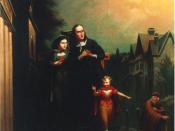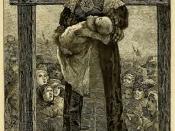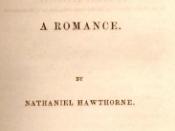Verbal irony ... is a statement in which the meaning that a speaker implies differs sharply from the meaning that is ostensibly expressed. The ironic statement usually involves the explicit expression of one attitude or evaluation, but with indications in the overall speech-situation that the speaker intends a very different, and often opposite, attitude or evaluation
Dramatic irony involves a situation in a play or narrative in which the audience or reader shares with the author knowledge of present or future circumstances of which a character is ignorant; in that situation, the character unknowingly acts in a way we recognize to be grossly inappropriate to the actual circumstances, or expects the opposite of what we know that fate holds in store, or says something that anticipates the actual outcome, but not at all in the way that the character intends
Structural irony occurs when a double level of meaning is continued throughout a work by means of some inherent feature such as a hero, narrator, or persona who is either naive or fallible (a participant in the story whose judgment is impaired by prejudice, personal interests or limited knowledge).
In studying Nathaniel Hawthorne's work, The Scarlet Letter, it is difficult for me to directly categorize the irony that I see present in the novel. For one thing, I find it very ironic that it is the priest that committed adultery. One would thing that in general, and especially in this puritanical society with its rigid morals and unyielding values, a priest would feel more than sworn to uphold his duties as a religious leader. However, Hawthorne chooses to portray him as human and fallible above all else. I sort of think of irony as being a contradiction. Either to what the audience expects or what a character expects.
Another example of irony that I see in The Scarlet Letter is the fact that Hester believes that she is helping the Rev. Dimmesdale by keeping their secret, when in fact, because he is not internally strong enough to step up and accept the blame himself, he is withering away as a result of her strength. Irony often times seems to be a contradiction or a correlation with events in a story. For example, Hester is so sad and depressed and isolated for the community as a result of her ignominy, and Pearl notes that "the sunlight never stays on you mother." This would be one way the events run parallel to emotion and are therefore ironic. However, as discussed above, the fact that because of Hester's strength, the Reverend grows weaker would be a contraction from what one might expect and is therefore also considered a tad ironic.
I suppose another example of irony would be the fact that the Rev. is living with and being cared for by, the former husband of Hester. The man one would expect to most ardently hate the Reverend is living with him and actually working hard to keep his health together. The fact that this man is a doctor of sorts and yet seems personally to be so physically unwell is ironic. Like a poor financial advisor or a mechanic that always has car troubles. Examples of irony are everywhere. Behold them in their vast literary glory!!


